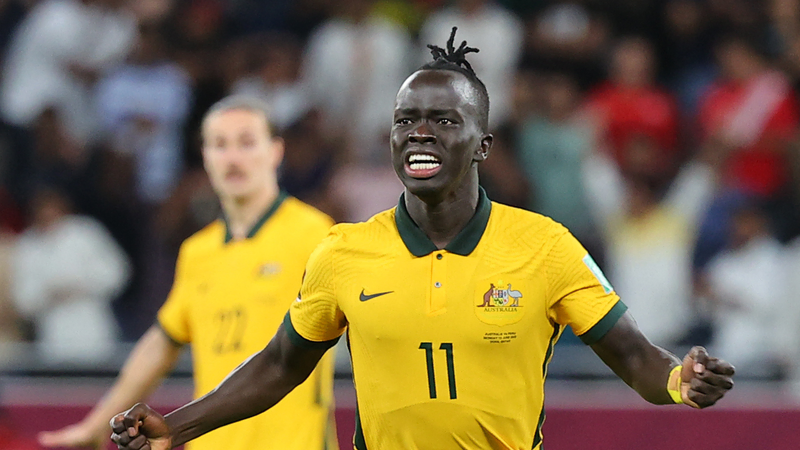Australian footballer, Awer Mabil has said he owes Australia his very existence after scoring his crucial sudden-death penalty for the country, to qualify for the World Cup.
According to the 26-year old, that goal was a thank you to the country that took his family in after they fled Sudan.
Awer Mabil booked Australia’s sixth spot-kick in a shootout against Peru before watching goalkeeper Andrew Redmayne heroically save the South Americans’ final penalty.
The win in Qatar saw Australia qualify for a fifth straight World Cup and Mabil complete a remarkable journey from a Kenyan refugee camp to football’s global showpiece.
“I knew I was going to score. It was the only way to say thank you to Australia on behalf of my family,” the winger said.
Mabil was born in a refugee camp in Kenya after his parents fled conflict in Sudan, surviving on one meal a day as a child and kicking a ball around to pass the time.
After being resettled in Australia in 2006, he developed his football enough to join Adelaide United as a teenager and then moved to Denmark’s FC Midtjylland.
He is currently on loan to Turkish club Kasimpasa.
“I was born in a hut, a little hut. My hotel room here is definitely bigger than the hut, the room we had as a family in that refugee camp. For Australia to take us in and resettle us, it gave me and my siblings and my whole family a chance at life. That’s what I mean by thanking Australia for that chance of life, that chance of opportunity they allowed my family.”
Mabil has been a regular for the Socceroos under coach Graham Arnold and said he hoped what he had achieved would inspire other refugees.
“I scored, a lot of my team-mates scored, everybody played a part and maybe that refugee kid played a big part,” he said.
Mabil was born in Kakuma, which is about as removed from the playing fields of an elite college as one could possibly imagine. But as an incubator for sporting and other talent, it puts many more renowned institutions to shame. Among its ‘alumni’ are AFL player Aliir Aliir and model Adut Akech.
It was within the confines of the Kakuma camp that Mabil played soccer with other refugees. Their chosen ball was a rolled-up sock — which, ironically, they kicked with bare feet — although they sometimes had enough plastic bags to fashion a sphere.
“They rolled them and they became hard, and that’s what they used as a football,” Mr Kuereng (Mabil’s uncle) said.
In 2006, with the help of his uncle, Mabil and his family secured passage to Australia and settled in Adelaide.
His sporting prowess stood out, and the preternaturally skilful Mabil made his A-League debut for Adelaide United at the age of 17.
His call-up to the national senior side came in 2018. But, in another irony, he just missed that year’s World Cup — his debut game was the Socceroos’ first after the tournament.
Months later, as Mabil was preparing to take to the field against the United Arab Emirates, his 19-year-old sister, Bor, was killed in a car crash in Adelaide’s north.
“He was playing soccer for Australia when he [received] the news of the loss of his sister,” Mr Kuereng said.
Mabil’s brother Awer Bul told the Adelaide Advertiser newspaper his family was overwhelmed with excitement. “To be a boy who was born in a refugee camp, it was quite a moving moment for our community. Just to see him walk out there for the Australian team gives us a good feeling.”















